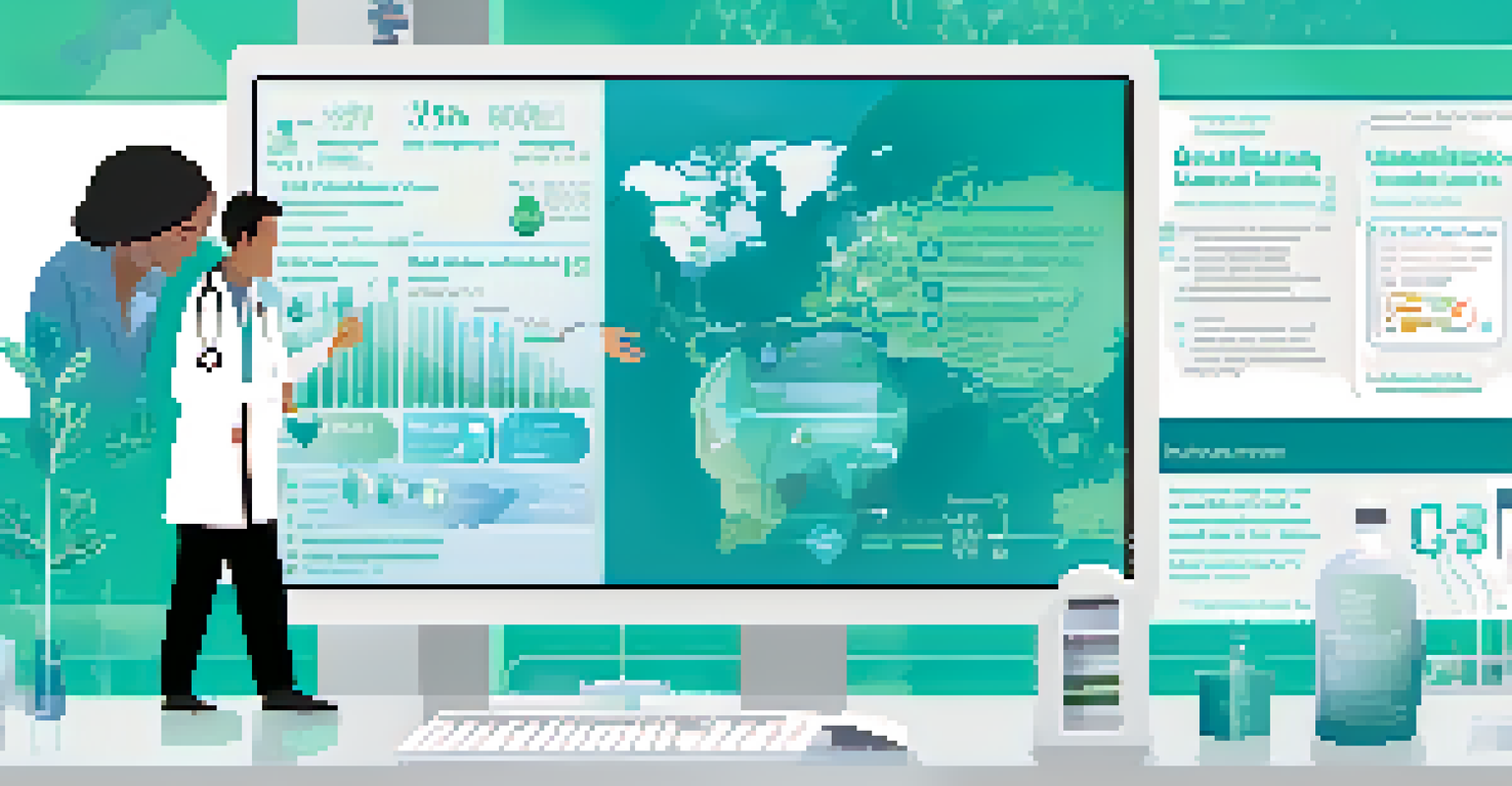Molecular Diagnostics: Early Detection of Diseases

Understanding Molecular Diagnostics and Its Importance
Molecular diagnostics is a branch of medical testing that examines genes, proteins, and other molecules to diagnose diseases. It plays a crucial role in personalizing treatment plans, allowing healthcare providers to tailor therapies based on an individual's genetic makeup. This precision medicine approach not only improves patient outcomes but also minimizes unnecessary treatments and side effects.
Molecular diagnostics are the key to unlocking the potential of personalized medicine.
By identifying specific genetic markers associated with diseases, molecular diagnostics can detect conditions at much earlier stages than traditional methods. For instance, in cancers, early detection often leads to better prognoses and higher survival rates. This technology empowers patients and doctors alike, fostering a proactive rather than reactive approach to healthcare.
As we move forward in medicine, the integration of molecular diagnostics is becoming increasingly essential. With ongoing research and technological advancements, the potential to uncover new diseases and improve existing diagnostic methods continues to expand, promising a future where many diseases can be caught before they become serious.
Key Techniques in Molecular Diagnostics
Several techniques are pivotal in molecular diagnostics, including polymerase chain reaction (PCR), next-generation sequencing (NGS), and fluorescence in situ hybridization (FISH). PCR, for example, allows for the amplification of specific DNA segments, making it easier to identify genetic abnormalities. This technique is widely used in infectious disease detection, where rapid results are crucial.

Next-generation sequencing takes things a step further by enabling comprehensive analysis of genetic material. This technique can sequence entire genomes, providing insights into hereditary diseases and cancer mutations. As an illustration, NGS has revolutionized how we understand genetic disorders, leading to more effective management strategies for conditions like cystic fibrosis.
Personalized Treatment Plans
Molecular diagnostics enables healthcare providers to tailor therapies based on an individual's genetic makeup, enhancing treatment effectiveness.
Lastly, FISH is a technique that visualizes specific genetic material in cells, helping to identify chromosomal abnormalities. This method is particularly useful in cancer diagnostics, where detecting specific gene rearrangements can inform treatment decisions. Each of these techniques plays a unique role in enhancing our ability to detect and understand diseases at a molecular level.
Applications of Molecular Diagnostics in Healthcare
Molecular diagnostics finds applications across various fields, including oncology, infectious diseases, and genetic disorders. In oncology, for example, it helps in identifying specific mutations that inform targeted therapy choices. By knowing which mutations are present, doctors can prescribe treatments that are more likely to be effective for each patient.
The greatest danger in times of turbulence is not the turbulence; it is to act with yesterday's logic.
In the realm of infectious diseases, molecular diagnostics has proven vital in quickly identifying pathogens. Techniques like PCR can detect the presence of a virus or bacteria, often within hours, which is especially critical during outbreaks. This rapid identification not only aids in timely treatment but also helps control the spread of infections.
Genetic disorders also benefit significantly from molecular diagnostics. Newborn screening programs often use these tests to detect conditions like phenylketonuria (PKU) early on, allowing for immediate intervention. This proactive approach can prevent severe health complications and improve the quality of life for those affected.
The Role of Molecular Diagnostics in Cancer Treatment
In cancer treatment, molecular diagnostics is transforming how we approach therapy selection and monitoring. By analyzing tumor DNA, doctors can identify specific mutations that may dictate which treatments could be most effective. This personalized approach helps in choosing therapies that target the unique characteristics of a patient's cancer.
Furthermore, molecular diagnostics aids in monitoring treatment responses. By performing tests on circulating tumor DNA (ctDNA), clinicians can assess how well a treatment is working without needing invasive biopsies. This not only enhances patient comfort but also allows for timely adjustments to treatment plans based on real-time feedback.
Early Disease Detection
By identifying specific genetic markers, molecular diagnostics can detect diseases at much earlier stages, leading to better prognoses and survival rates.
The integration of molecular diagnostics into clinical practice is leading to improved outcomes for cancer patients. Studies have shown that patients receiving targeted therapies based on molecular testing have better survival rates and fewer side effects compared to those receiving standard treatments.
Challenges and Limitations of Molecular Diagnostics
Despite its numerous benefits, molecular diagnostics also faces challenges and limitations. One major hurdle is the high cost associated with advanced testing technologies, which can limit accessibility for some patients. Insurance coverage can also vary, leaving patients to navigate complex billing scenarios.
Additionally, the interpretation of molecular diagnostic tests can be complicated. Not all genetic mutations have clear implications for treatment, and the significance of certain results may not be fully understood. This uncertainty can lead to confusion for both patients and healthcare providers, making informed decision-making more challenging.
Finally, the rapid pace of technological advancement can create a knowledge gap among healthcare professionals. Continuous education and training are essential to ensure that practitioners can effectively utilize molecular diagnostics in their practice. Addressing these challenges is vital for maximizing the potential of molecular diagnostics in clinical settings.
Future Trends in Molecular Diagnostics
The future of molecular diagnostics looks promising, with ongoing advancements that are set to revolutionize early disease detection. One of the most exciting trends is the development of liquid biopsies, which analyze biomarkers found in bodily fluids like blood. This less invasive approach could become a standard for monitoring various conditions, including cancer.
Artificial intelligence (AI) is also playing a significant role in enhancing molecular diagnostics. By leveraging machine learning algorithms, researchers can analyze vast amounts of genetic data to identify patterns that may not be visible to the human eye. This capability could lead to earlier and more accurate disease detection, paving the way for timely interventions.
Challenges in Accessibility
Despite its benefits, high costs and complex interpretations of molecular diagnostics can limit accessibility and create confusion for patients and providers.
Moreover, the democratization of genetic testing is on the rise, with more companies offering direct-to-consumer genetic tests. While this trend increases awareness and accessibility, it also raises questions about data privacy and interpretation. As we move forward, balancing innovation with ethical considerations will be crucial in shaping the future landscape of molecular diagnostics.
How Patients Can Benefit from Molecular Diagnostics
Patients stand to gain immensely from the advancements in molecular diagnostics. Early detection of diseases can lead to timely treatment, significantly improving outcomes and survival rates. For instance, when cancers are detected at an early stage, patients often have more treatment options and better prognoses.
Moreover, molecular diagnostics empowers patients by providing insights into their health risks. Genetic testing can reveal predispositions to certain conditions, enabling individuals to take proactive steps towards prevention or early intervention. This knowledge can be life-changing, offering peace of mind and a sense of control over one's health.

Finally, as molecular diagnostics continues to evolve, patients can expect a more personalized healthcare experience. With treatments tailored to their genetic profiles, individuals can receive therapies that are not only more effective but also come with fewer side effects. This shift towards precision medicine is truly a game-changer in the realm of healthcare.